Migrant and refugee women in Europe have a feminist platform to join forces and fight for their rights. The European Network of Migrant Women is strengthening women voices, through policy advocacy and community building.
by Juliana da Penha
In Brussels, where most parts of the European policies are designed and decided, migrant, and refugee women have an organisation building a collective action to guarantee their space in the political discussion.
Formalised in 2012, ENoMW is a network of over 50 members, who are migrant and refugee women organisations and over 100 individual women, in 23 different European states.

The idea of the network started earlier, as a project of the European Women’s Lobby before it became its own entity. Salome Mbugua, co-president of the network has been within ENoMW since the early stages. Originally from Kenya, she is a researcher, gender equality activist and human rights advocate. She has more than 20 years of experience working with underrepresented groups, particularly women in Ireland, where she lives since 1994. Salome is founder and Head of Operations and Strategy of AKIDWA, the national network of migrant women in Ireland, which next year will complete 20 years old.
Salome explained that after a meeting in Sofia, Bulgaria, in 2008, discussing how they could better support migrant and refugee women in Europe, they felt the need to create their entity. “Having a platform itself is very important because migrant women are not a homogeneous group. In European countries, there are women from Europe, as well as women coming from different continents, with different migration status. The issues of migrant women are many. The ways to solve these problems need to be led by migrant women themselves”, explains Salome.
The issues of migrant women are many. The ways to solve these problems need to be led by migrant women themselves” Salome Mbugua
As co-president, position Salome share with Dr Noura Raad; they have to make sure that everything on the network is running according to ENoMW mission and vision. They also have to guarantee that everybody participates within the network, whether they are board, staff or volunteers.
“The role of the co-president is important, but all the roles are equally important because we all represent the organisation in different platforms, in terms of giving presentations and taking forward our views,” explains Salome.
A network of diverse women
From grassroots service providers to organizations focused on advocacy and research, the diverse members reach women from almost all regions of the globe. 85% of the board members of ENoMW is reserved for migrant women.
The network offers two types of memberships with different rights and obligations: full members -for legally registered organizations, and supportive members – open to formal and informal groups and individuals.
“The fact that ENoMW is a network of organisations and individuals is special because we have a range of women and topics. We do not only talk about violence against women but also organise cultural actions. For me, it is a melting pot of women and feminist women. That’s why I appreciate the network because I can meet so many people.” says Adriana S. Thiago, Communications Officer.
“The fact that ENoMW is a network of organisations and individuals is special because we have a range of women and topics” Adriana S. Thiago
Adriana was born in Luxemburg from a Portuguese mother and a Brazilian father. Now she lives in Brussels. She started to work at ENoMW as a volunteer intern and soon became involved with Radical Girlsss, a group of young migrant women born inside ENoMW.
Radical Girlsss was created to raise the voice of migrant and refugee girls about specific issues they face today, such as online harassment. And also, to make communication between old and new generations of feminist.
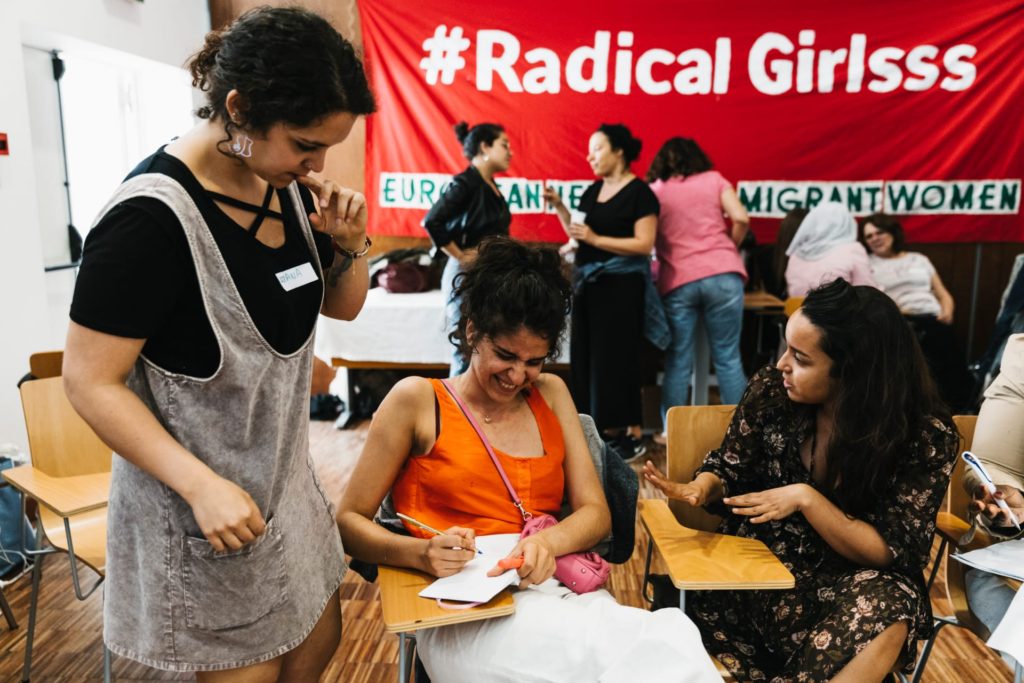
“We needed a group that would bring the concerns of young women to the fore, but that would be able to maintain the relationship with the women who founded the feminist movement, the women who have been in the movement for many years”, explains Adriana.
Radical Girlss, have 13 members from Belgium, France, Scotland, England, Spain, Portugal, Poland and Italy. Before the pandemic, they were active on the ground and organized actions such as feminist summer camps, to educate young migrant and refugee women on feminism and women’s rights. Now they are active online, organizing campaign such as “10 myths about pornography” with webinars with researchers and activists working on prostitution, sexual violence and sexual exploitation.

Adriana is now a staff member, in charge of internal and external communication and social media. She is also responsible for writing reports, statements, maintaining a relationship between the network and organisations. She is in charge of communicating with members, explaining what is being done, seeing what they are doing to help in advertising or helping in any way with their projects.
“From outside the network seems very big, but in fact, it is a small group. We do not have so many economic resources, and the survival of the network depends on the engagement of each one of us”, explains Adriana.
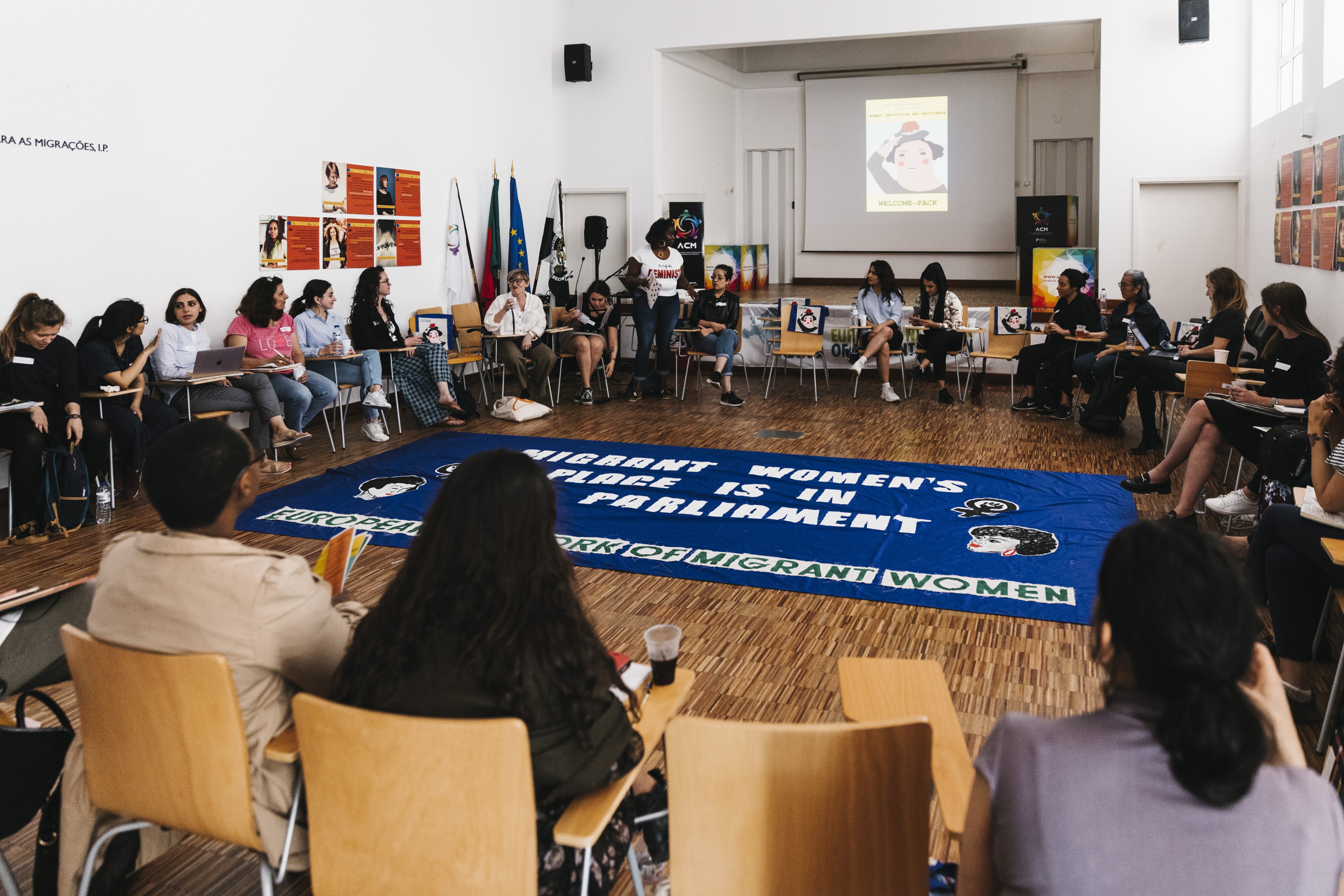
Before joining the organization, members are asked to fill a form with different questions regarding their views on feminism, secularism and human rights, the core values of ENoMW. “In our questionnaire, we want to know who our members are. We want to remain truthful to our name. And we are quite proud of it”, explains Anna Zobnina, Policy Coordinator.
“There is a lack of space, visibility and recognition of the analysis that migrant women bring into the European perspective. This is important, and we fight for this.” Anna Zobnina
Anna, who is also currently serving as a member of the Executive Committee of the European Women’s Lobby, is originally from Russia and now lives in Scotland. She has the responsibility to overview the entire network in terms of where they are moving as an organization, their strategic priorities, relationship with partners and how they position themselves within necessary political process and decisions.
“There is a lack of space, visibility and recognition of the analysis that migrant women bring into the European perspective. This is important, and we fight for this”, explains Anna.

Active on the grassroots and at the policy level
The organisation built a presence and participation in the policy level discussions in Brussels “The European institutions are well aware of the network. They also invited us to give our input to the EU policies, whether they are talking about the Istanbul convention, CEDAW, migration and integration in the European Union. We are collecting what is happening at the regional and national levels, showing what the issues are and what are the challenges. And also, the positive aspects of what migrant women are doing, whether a good project was implemented. We also show what we can learn from migrant women”, explains Salome Mbugua.
ENoMW value the importance to be part of the policy level discussions, but the organisation ambition is also to be active as a community. “This connection with our members is crucial. One of the things I am determined not to do is to become one of those organisations who don’t have direct and consistently link between policy work at the grassroots level”, explains Anna Zobnina.

The network members work in different areas; from human rights, women rights, sexual and reproductive rights, economic empowerment, anti-discrimination and social justice.
This platform is an opportunity to migrant and refugee women to connect, network, exchange experiences and works together.
“I am a second-generation migrant, and I know I don’t have so much trouble creating networks in the country where I am. But I know that there are women who feel alone. And some women need the help of an organisation to be able to promote their projects, to be able to raise their voices”, explains Adriana S. Thiago.
ENoMW Actions
One of ENoMW’s work is the production of publications about the issues affecting migrant and refugee women in Europe such as statements, position papers and reports. “Femicide of migrant women- the extreme form of male violence against women”, is one of the few publications breaking the silence around misogynist killings of migrant women in Europe.
In this moment of the pandemic in which most of physical services and activities are restricted, ENoMW built a digital presence with projects such as Migrant Women Reality Watch. It is a series of live interviews hosted on ENoMW Facebook page. They invite women to speak about different subjects, from a critical feminist perspective, providing information not available in mainstream media.
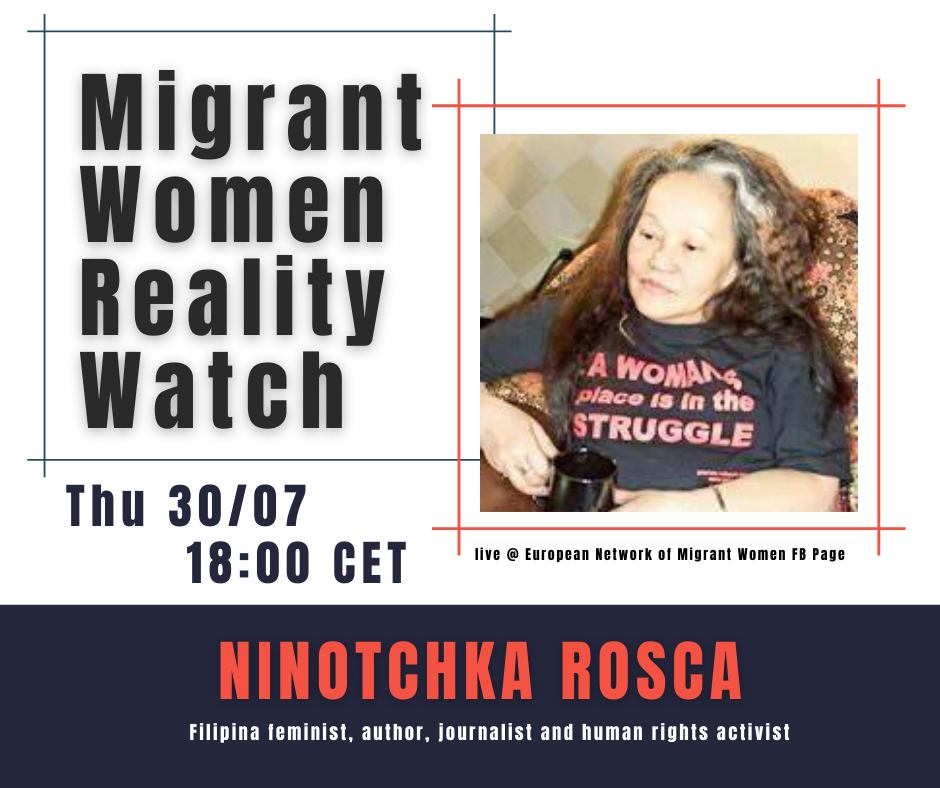
Another area in which ENoMW is active is in the organisation of webinars around the issues migrant and refugee women faces. Recently, they organised the webinar “Surrogacy- globalised industry of reproductive exploitation of women &girls” with feminists from Europe and Latin America. On the occasion of the International Day Against Gender-Based Violence (25th November), ENoMW published a statement on Surrogacy denouncing this practice.
“We understood that Surrogacy is a kind of violence against women, a form of sexual and reproductive exploitation of women”, explained Anna Zobnina.
A recent event organised by ENoMW was “Assisting Trafficked Women” a seminar on best practices in legal assistance and integration support to female migrant victims of sex trafficking in Europe. This seminar was an outcome of a two-year project in which ENoMW participates and was coordinated by ENoMW member and Immigrant Council of Ireland. It brought together representatives of institutions, policymakers, service providers and migrant women, including survivors of trafficking to discuss and exchange the best practices on legal assistance and service provision tailored to the needs of female migrant victims of trafficking for sexual exploitation in Europe. Organising the event online meant that participants from different regions could attend. Including the 40 female survivors of sex trafficking in the Gambia, members of Girls Against Trafficking Network.
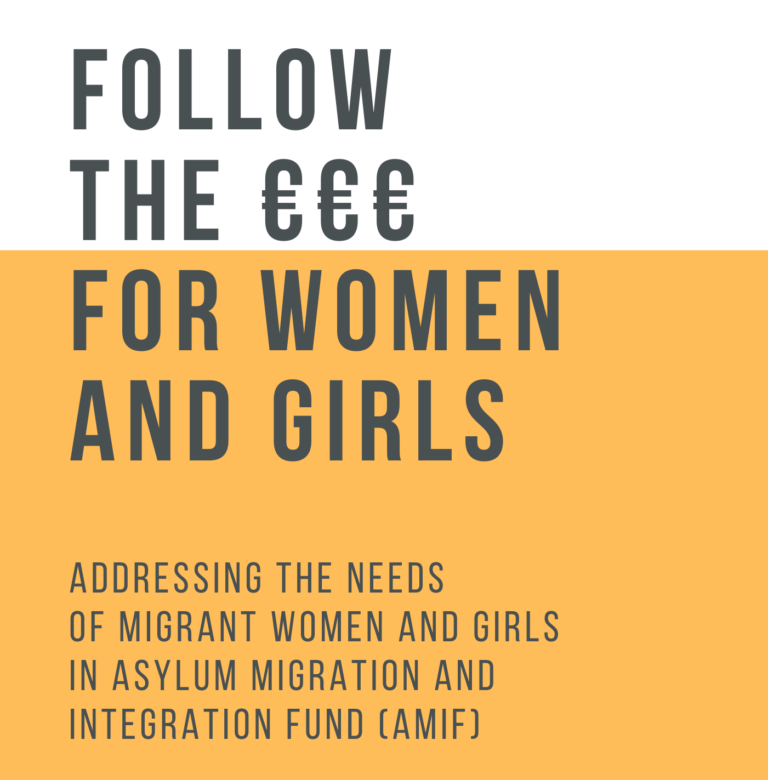
At the beginning of 2020, ENoMW published a study called “Follow the Money for Women and Girls”, on how the European Union complies with the requirements of gender-mainstreaming, i.e mainstreaming of equality between women and men, in funding allocation for programmes and actions on asylum, migration and integration. This study showed that only very little money goes to migrant women grassroots organisations and the needs of refugee and migrant women and girls remain largely overlooked in those programmes.
“One important element that makes our network rich and gives us a perfect perspective is that is not Eurocentric.” Anna Zobnina
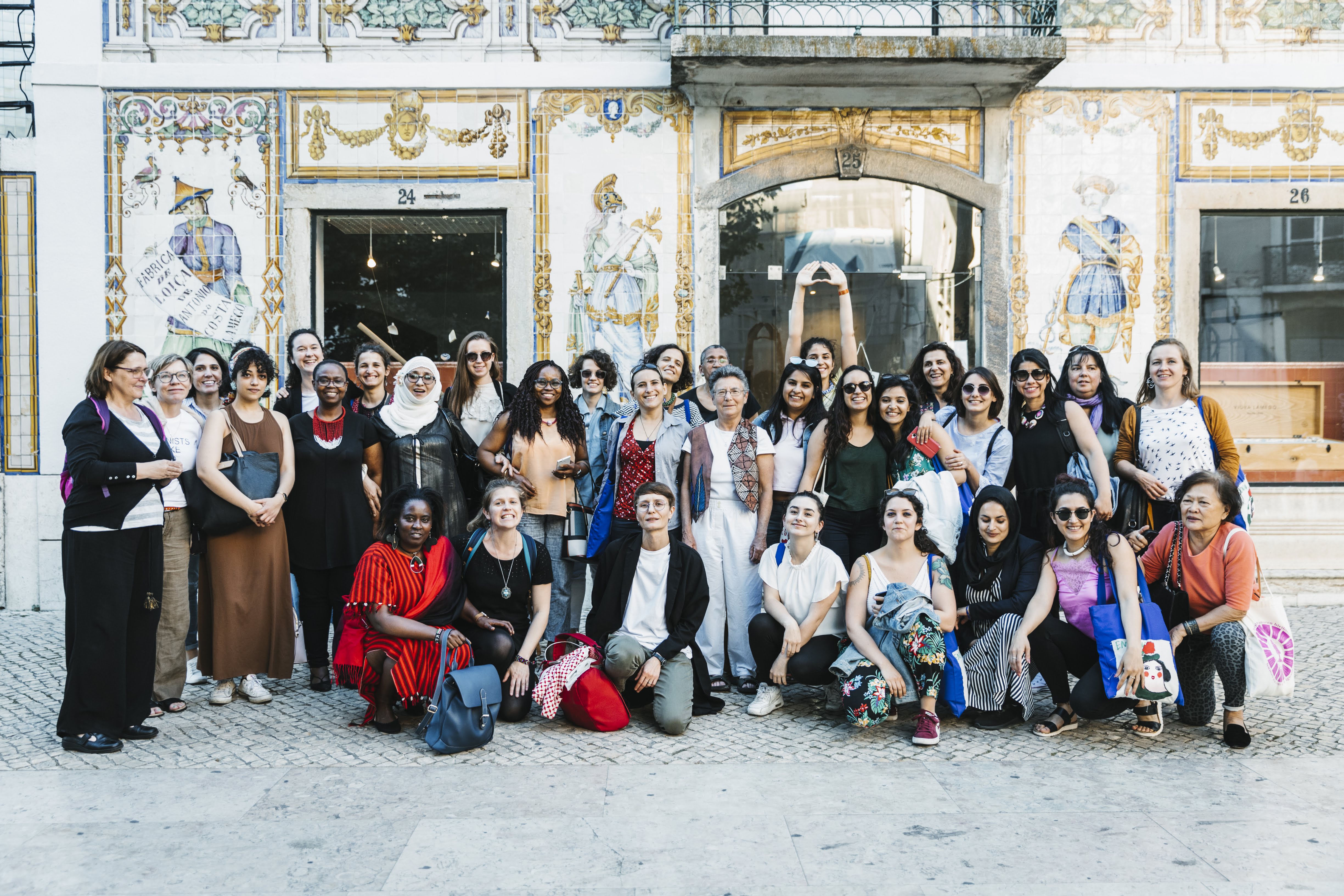
Recognising the diversity of their members, a significant action by the network is the translation of their papers, statements and also events. You can generally find their information in English, French, Portuguese, Spanish and Russian. “I believe that the feminist movement is still very Anglo-speaking, hardly accessible to non-English-speaking people. So, what we try is always to translate everything we write into other languages then that other women can also read”, explains Adriana S. Thiago.
“One important element that makes our network rich and gives us a perfect perspective is that is not Eurocentric. It takes into account different stories and backgrounds, languages, culture and religions or the absence of religions. This richness is meaningful because we then connect different women, regardless and across our differences”, explains Anna Zobnina.
“The most important part of our work is to promote equality and justice of migrant women within Europe” Salome Mbugua.
